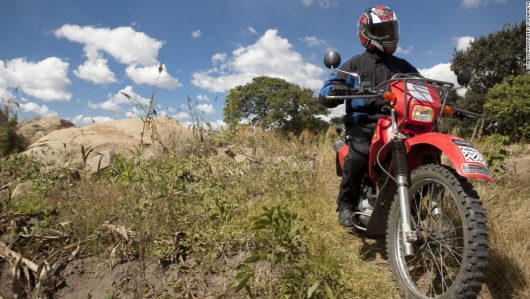Riders for Health Delivers Medical Services to Doors in Africa

One of the largest barriers to medical services in rural areas, such as Sub-Saharan Africa, is unreliable transportation. More than 60% of Africans live on dirt roads and paths.
Riders for Health works alongside other health-focused organizations and ministries in managing fleets of motorcycles and four-wheeled vehicles that health workers use to reach people living in remote locations. They deliver supply chain distribution, mobilizing outreach volunteers, sample transport and emergency referrals. Riders for Health trains participants as mechanics to prevent motorbikes and vehicles from keeping communities without health care. They have reached people across seven countries — 14.5 million people have gained health care access; 2.9 million have contact with health professionals yearly, and roughly 400,000 blood and sputum samples have been transferred between laboratories and health centers by Riders for Health.
The organization’s mission is to prevent death by an easily preventable, or curable disease, due to distance, terrain or poverty. Ministries of health, international and African NGOs, private-sector organizations, local community-based organizations and religious groups have worked with Riders for Health to deliver medical services to about 21 million people.
Across Sub-Saharan Africa, The World Health Organization estimates millions of lives are unnecessarily lost yearly because of preventable and treatable diseases. Spanning the country, roughly 12,000 children die daily from illnesses, like pneumonia, diarrhea, measles, malaria and malnutrition. Most cases aren’t due to vaccines and medicines not existing, but unreliable transportation prevents millions of people from getting the medical services they need. British racing journalist Barry Coleman and his wife Andrea found this notion unacceptable, so they started Riders for Health together.
However, the organization was forced to shut down the front doors of their U.K. branch earlier this year. Riders for Health continues to operate in Liberia, The Gambia, Lesotho, Zimbabwe, Nigeria, Kenya and Malawi. Unfortunately, the U.K. program launched in 1996 was cut due to lack of funds, according to the Official MotoGP charity Riders for Health.
In the late 1980s, Coleman visited Somalia and found piles of new-looking motorbikes and broken down vehicles, due to poor maintenance. He saw the risks women and children faced because they lacked sufficient healthcare delivery. His wife recalled children needing immunizations and women dying during childbirth, while cars, motorcycles and ambulances sat miles away at the ministry of health car parks.
Riders for Health has equipped outreach health professionals to visit almost six times more people while spending double the amount of time with their patients. Now every month, Riders for Health can hold 3,500 more health-education meetings a month across the continent. Bubacarr Jallow, a community health nurse for Riders for Health, started the program with a Yamaha AG100 and continues to deliver medical services four years later. He’s traversed over 50,000 kilometers, covering more than 10,000 people in 13 villages.
– Rachel Williams
